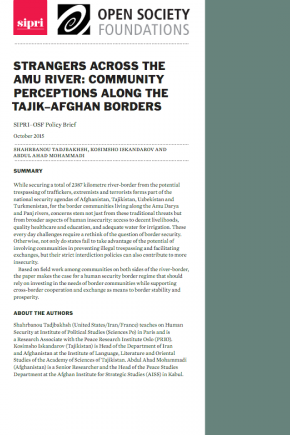Strangers Across the Amu River: Community Perceptions Along the Tajik–Afghan Borders

While securing a total of 2387 kilometre river-border from the potential trespassing of traffickers, extremists and terrorists forms part of the national security agendas of Afghanistan, Tajikistan, Uzbekistan and Turkmenistan, for the border communities living along the Amu Darya and Panj rivers, concerns stem not just from these traditional threats but from broader aspects of human insecurity: access to decent livelihoods, quality healthcare and education, and adequate water for irrigation. These everyday challenges require a rethink of the question of border security. Otherwise, not only do states fail to take advantage of the potential of involving communities in preventing illegal trespassing and facilitating exchanges, but their strict interdiction policies can also contribute to more insecurity.
Based on field work among communities on both sides of the river-border, the paper makes the case for a human security border regime that should rely on investing in the needs of border communities while supporting cross-border cooperation and exchange as means to border stability and prosperity.
